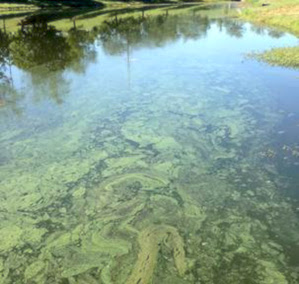| ||||||||||
Dr. Ronald P. Rogers CHIROPRACTOR Support for your body's natural healing capabilities 270-384-5554 Click here for details 


Columbia Gas Dept. GAS LEAK or GAS SMELL Contact Numbers 24 hrs/ 365 days 270-384-2006 or 9-1-1 Call before you dig Visit ColumbiaMagazine's Directory of Churches Addresses, times, phone numbers and more for churches in Adair County Find Great Stuff in ColumbiaMagazine's Classified Ads Antiques, Help Wanted, Autos, Real Estate, Legal Notices, More... 

|
Division of Water warns of Harmful Algae Blooms risks Holiday Water Recreation Tips Issued from Public Health, Division of Water. DOW and DPH recommend avoiding areas with Harmful Algal Blooms (HABs). Blue-green algae occur naturally in the environment and are a vital part of the ecosystem. HABs arise when there are excess nutrients (phosphorus and nitrogen), sunny conditions, warm temperatures and low-flow or low-water conditions. But state agency says, By using common sense, your risks of experiencing water-derived health issues can be greatly decreased. Click on headline for complete story with photo(s) By John Mura & Lanny Brannock News from the Kentucky Environmental & Energy Cabinet FRANKFORT, KY (Thu 22 Jun 2018) - With summer upon us and July 4th quickly approaching, the Kentucky Division of Water (DOW) and the Kentucky Department for Public Health (DPH) offer these safety tips to help Kentuckians enjoy the many rivers, lakes and creeks in which we boat, fish, swim, canoe or otherwise enjoy our abundant water resources. Despite many water quality improvements, there is the potential for human health risks in any body of water. By using common sense, your risks of experiencing water-derived health issues can be greatly decreased. DOW and DPH recommend avoiding areas with Harmful Algal Blooms (HABs). Blue-green algae occur naturally in the environment and are a vital part of the ecosystem. HABs arise when there are excess nutrients (phosphorus and nitrogen), sunny conditions, warm temperatures and low-flow or low-water conditions. The more typical green algae, which do not produce toxins, come in many forms and may appear as underwater moss or stringy mats. Blue-green algae, on the other hand, appear as slicks of opaque, bright-green paint, but closer inspection often reveals the grainy, sawdust-like appearance of individual colonies or bacteria. The color of the algae may also appear red or brown. If you are concerned that you have symptoms that are a result of exposure to HABs, please see your doctor and call your local health department. DOW and DPH recommend that the public follow these guidelines to avoid exposure to HABS:
If contact has been made with water containing blue-green algae, wash off with fresh water. In some cases, skin irritation will appear after prolonged exposure. If symptoms persist, consult your local health care provider. Fish fillets (not organs) may be consumed after the fillets have been rinsed in clean, non-lake water. It is advisable to wash any parts of your body that have come into contact with the fish. More information concerning the quality of Kentucky's water resources such as advisories or impairments can be found on the Kentucky Water Health Portal watermaps.ky.gov/WaterHealthPortal. For more information on healthy swimming in all water bodies, visit cdc.gov/healthywater/swimming. This story was posted on 2018-06-22 02:24:56
Printable: this page is now automatically formatted for printing.
Have comments or corrections for this story? Use our contact form and let us know.
More articles from topic News:
Green Co. Fiscal Court to receive $120,720 in emergency funds Homeless shelter location change announced by J.O.Y. Ministries A Heads Up for Vendors: Fall Book Fair 6 Oct 2018 at Wheet Hall About 30 participate in Hoop It Up basketball camp Adair Republican Party meets Thu 21 Jun 2018 CAUD Boil Water Advisory Roley-Yuma, Dry Creek Roads area - LIFTED Easy Flower Garden - E/MC Chamber Quarterly Breakfast is Tue 26 Jun 2018 Superior Battery hosts community open house and Chamber Great Oaks Ministries VBS sign-up Sat 23 Jun 2018, at KAVFD View even more articles in topic News |


|
||||||||
|
| ||||||||||
|
Quick Links to Popular Features
Looking for a story or picture? Try our Photo Archive or our Stories Archive for all the information that's appeared on ColumbiaMagazine.com. | ||||||||||
|
Contact us: Columbia Magazine and columbiamagazine.com are published by Linda Waggener and Pen Waggener, PO Box 906, Columbia, KY 42728. Please use our contact page, or send questions about technical issues with this site to webmaster@columbiamagazine.com. All logos and trademarks used on this site are property of their respective owners. All comments remain the property and responsibility of their posters, all articles and photos remain the property of their creators, and all the rest is copyright 1995-Present by Columbia Magazine. Privacy policy: use of this site requires no sharing of information. Voluntarily shared information may be published and made available to the public on this site and/or stored electronically. Anonymous submissions will be subject to additional verification. Cookies are not required to use our site. However, if you have cookies enabled in your web browser, some of our advertisers may use cookies for interest-based advertising across multiple domains. For more information about third-party advertising, visit the NAI web privacy site.
| ||||||||||





















































